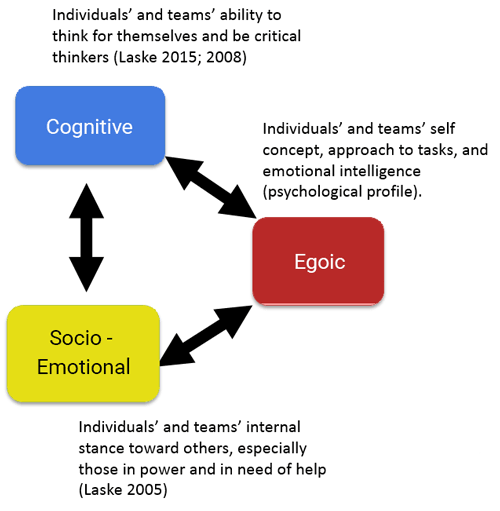The future of work is not a topic for logical thinking as much as it is one for revamping logical into complex, 'dialectical', thinking. The difference between the two is explained and exercised in a workshop in Brussels whose program can be downloaded here. If interested in this workshop, held on January 18, 2019, near Brussels, write to jan@connecttransform.be, my co-author of a book on collaborative intelligence of teams entitled "Dynamic Collaboration" (2018). In the downloadable attachment, the program is commented upon from a dialectical-thinking point of view by Otto Laske. Program Jan 18 2019 Brussels Read More...
Category: Nature of Work
The Future of CDF Is Bright: What the Early Adopters Saw
This blog makes accessible, and comments on, a 2010 publication of the Interdevelopmental Institute (IDM) on the Constructive Developmental Framework (CDF) that is still largely unknown in Europe and the US. The publication is in the form of an issue of Wirtschaftspsychologie, a Swiss-German magazine focused on the psychology of work delivery, and referred to as Themenheft. The publication was assembled upon the invitation of Prof. emeritus Theo Wehner, Institut fuer Arbeitswissenschaft, ETH Zurich, Switzerland. The Themenheft articles introduce a new conception of human resources and, related to that, new ways of supporting organizational work by way of consulting, coaching, team and leadership development. The articles anticipate what later would be called by Kegan & Lahey the "deliberately developmental organization." As in Jaques's conception of "requisite organization", the assumption is made that there is ultimately no conflict between work force development and client and stakeholder satisfaction. Viewed from a broader, methodological, perspective, CDF represents a novel approach to carrying out qualitative and quantitative research in the social sciences. It promotes empirical research of a kind that overcomes the positivistic tendencies of purely logical thinking, and thereby avoids reifying social and psychological processes rather than making them transparent in their unfolding... Read More...
New Dialog Methods for Broad-Spectrum Systems Constellations: Comments on the Milano Workshop on Intelligenza Collaborativa Nel Team
As shown at and, on this website, at , a workshop on new dialog methods specifically for creating collaborative intelligence in teams will take place in Milano, Italy, on January 30-31,2018. The workshop is offered by Consulenza Evolutiva, Milano and its Altroove School, and staffed by Lorenzo Campese, Alessandro Rossi, and Otto Laske. The workshop is a pioneering first in that it introduces Broad-Spectrum Systems Constellations which broaden the focus of attention of conventional constellations as detailed in the attached pdf. The workshop is held both in Italian and English. Those interested in signing up for the workshop with Consulenza Evolutiva will find further details on the workshop process below. Broad-Spectrum Systems Constellations Read More...
A Developmental Systems-Constellation Workshop for Advancing Shared Leadership in Holacratic Environments
Shared or distributed leadership in holacratic environments is often more of a hope or an advertisement than a reality. This is so because leadership is an adult-developmental issue that behavioral training methods are not equipped to handle. However, tools originating in adult-developmental research (since 1975) are still unknown or else eschewed in behaviorally thinking companies, to their own detriment. This article describes the purpose, structure, goal, and outcomes of a workshop based on the Constructive Developmental Framework (CDF). It is an initial offering for preparing a company for undertaking a series of advanced team work sessions. Parties interested in evidence-based deliberately developmental approaches to leadership are invited to contact otto@interdevelopmentals.org. Proposal for systemic constellation work Read More...
Human work capability and complex thinking: Introducing the second, improved edition of MHD2 (2008)
In a time of increasing digitization of human resources and their management it is urgent to explain the limits of replacing human intelligence by algorithmic intelligence, or molding the use of human intelligence by algorithms. What is required is not only a deeper understanding of the human capability for work delivery, but the intrinsic limits of boosting work delivery algorithmically given the nature of human intelligence, attention and accountability. In this new preface to the second edition of my 2008 publication of Measuring Hidden Dimensions of Human Systems (MHD2) I highlight the many new concepts this publication introduced almost 10 years ago. I want to promote deeper insight into the nature of human action logic compared to algorithmic logic, and the need for strengthening human action logic by way of deliberately developmental processes, both social-emotional and cognitive. The volume demonstrates that work delivery becomes possible in individuals as well as teams by the mind's construction of an “internal workplace” that accounts for both motivation for work and conceptual clarity in delivery of work. As shown in the book, the internal workplace is influenced by both the social-emotional and psychological dimensions of personality combined with the level of thinking complexity at... Read More...
Transforming culture by transforming dialog in organizations and institutions
This short text explains what is important about crafting new forms of dialog in organizations and institutions seeking to be innovative. The text points to DTF, the Dialectical Thought Form Framework (2008, second edition 2017), that was introduced in a previous post entitled “A new approach to dialog.” In a time of deliberately developmental organization and organizations transcending rigid managerial hierarchies, the dialogical approach to thinking and managing here highlighted becomes an essential part of innovation. Short Preface, A new approach to dialog OL 3-2017 Read More...
